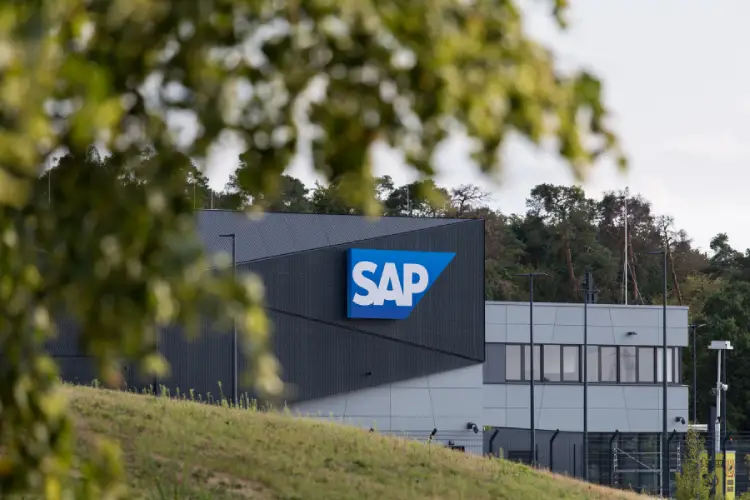
Covid-19’s impact on IT spending was laid bare on Tuesday when SAP was forced to downgrade its financial expectations for the year, blaming the dwindling number of digital transformation projects during the pandemic.
The ERP software business saw more than 20% wiped off its value on Tuesday after publishing a revised forecast for the year alongside its Q3 earnings, stating that it expects revenue and profit for 2020 to be lower than previously thought. This news was not well-received by traders and investors, with SAP’s market cap falling from €147bn to €118bn, thought to be its worst trading day for at least 12 years.

In April, when it delivered its initial projections for 2020, SAP had expected revenues to bounce back by the beginning of 2021, but CFO Luka Mucic said this was no longer realistic.
Speaking on an earnings call, he said: “Back [in April] we had assumed the demand environment would gradually improve in the third and fourth quarters. While we still see robust customer interest in our solutions to drive digital transformation, regrettably lockdowns have just recently been reintroduced in some regions, infection rates have re-accelerated and as a result demand recovery has been more muted.
“For these reasons, we no longer anticipate a meaningful recovery in SAP Concur and business travel-related revenues for the remainder of the year.”
IT spending stymied by pandemic
SAP’s struggles highlight the restrictions on IT budgets which are beginning to hit home as businesses come to terms with the ongoing effects of Covid-19.
Initially, spending boomed during the pandemic as businesses adjusted to new patterns of working, with heavy investment in infrastructure required by many firms to transition to large-scale remote working. Indeed, the 2020 CIO survey from KPMG and Harvey Nash found that $15bn a week was spent on new IT infrastructure during the first three months of the pandemic. Crucially for SAP, much of this investment went into cloud-enabled platforms, rather than the German firm’s traditional on-premises solutions.
Reality is now starting to bite after this initial bonanza, and just 43% of CIOs who took the survey expect budgets to go up in the year ahead. Indeed, Gartner predicts global IT spend to be $3.5tril this year, down 7.3% compared to 2019. Within enterprise software, spending is set to fall 5.7%, to $4.49bn.
S&P Global paints a slightly less gloomy picture, expecting a 3% spending cut over the year. Lead analyst Andrew Chang said companies such as SAP, which are transitioning from on-premises to cloud solutions, are likely to be among the hardest hit.
“Issuers in the early stages of transitioning to subscription models from on-premise face headwinds because some customers are deferring long-term renewal decisions until economic conditions improve,” he said. “Major software implementations requiring upfront payments are also facing pushbacks as customers realign IT budgets to support remote work projects.”
SAP outlook: 2023 target becomes 2025 target
SAP now anticipates profits of €8.1–8.5bn for the year, rather than the previously predicted €8.1–8.7bn. This is based on expected revenue of €27.2–27.8bn, as opposed to €27.8–28.5bn.
It comes after a predictably slow Q3, which saw year-on-year operating profit fall from €2.09bn in Q3 2019 to €2.07bn this year. Total revenue was down to €6.54bn from €6.81bn.
Last year the company announced it was targeting revenue of more than €35bn by 2023, but has now pushed this back to 2025 as a result of the pandemic, by which time it expects its revenue to grow to €36bn, €22bn of which will be derived from its cloud business. To that end, it was have been buoyed by a rise in Q3 cloud revenue to €1.98bn from €1.81bn at this time last year. The switch to a cloud focus is likely to hit operating margins by up to 5% by 2023, CEO Christian Klein said.
He said: “We now anticipate a more conservative Covid-19 recovery. We assume Covid-19 will affect the economies for at least the first half of next year. Nobody can predict the impact beyond 2020, but it is prudent to assume a more gradual recovery. For our on-premises business, we have seen significant investment delays in 2020 and across all industries and geographies we see an increasing demand to accelerate transition to the cloud.”
Striking a more positive note, he added: “The pandemic, which we’d all hoped would be easing by now, is giving us an inflection point for customers and a catalyst to evaluate their transformation efforts. It has put a spotlight on resiliency which is about more than the underlying infrastructure and its move to the cloud. It’s about adapting to new digital business models and driving automation.”
How SAP adapts to what Gartner describes as the “ERP’s fourth era – Enterprise Business Capabilities”, with customers increasingly demanding flexible solutions to meet their changing business needs, is likely to play a big part in whether the company can hit these targets over the next five years.






